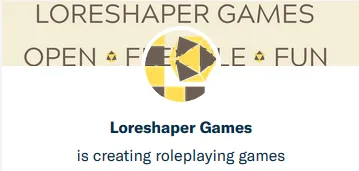I've been struggling with a notion of what I want to do with the Loreshaper Games Patreon account for a while. It's a great opportunity for Loreshaper Games to support creators love (like @jeremyhartillos), but it's also something that I would like to use as a way to finance projects, since I often lack the personal spending money and Loreshaper Games doesn't necessarily "make" this "money" thing the kids talk about.

Oh my, this does make it official, doesn't it?
At the same time, I've been dealing with a lot of personal conflicts regarding the Patreon thing. We make free games, after all, not behind-paywall games.
That puts us at a point where we have a hard time justifying our value and our obligations to patrons while still remaining true to our driving principles.
I've gotten a lot better about keeping up forward progress on games, which is a key step to having this Patreon thing work, and I think that it'll be part of what helps us move forward in a way that is both ethical and practical, since the sorts of projects we've got planned going forward are definitely outside my budget.
This is also an issue with Kickstarter, so I want to talk about what goes into striking that balance between offering value to paying "customers" while still generally making everything free. Steemit's a great way around this particular dilemma, but the tabletop RPG community here is relatively small and not full of whales, so it's not a great funding scheme either. It has an upside of also helping us support creators, but our ability to do so is, once again, limited.
However, again, unless the miracle we've all been waiting for happens, Steemit is not a good solution here.
Originally I had planned to do adventures and put those behind a paywall, but I've found that doing so is probably not going to work as a money source for a couple of reasons. Part of that is our current audience size; at this rate we should have well over five-hundred downloads on DriveThruRPG by the end of the year, and if every single one of those bought a $5 adventure, we could use that as a financing stream to support our bigger products.
However, you're stuck with the simple math: using a small product of marginal value to many customers is not going to pay for a larger product.
Another thing we could do is go the Posthuman Studios route of having the books be available freely on our creator's blog, but then post them up on DriveThruRPG for purchase (and not pay-what-you-want). This is something that I think could be a bit of a dilemma, since I don't want anyone to feel ripped off.
On the other hand, it would be nice to have money. We might go this route, but not until mid-to-late 2019.
With that said, there are three things I think I am comfortable offering to patrons that are both mutually desirable and not too terribly inconveniencing.
The first is early access to products. I'm not sure that this would ever necessarily lead to additional playtesters or the like (though I'm willing to dream), but it would be something that is an easy offer to backers. Since we've spun our Patreon up, I wouldn't be holding your breath too hard for early-access drafts up on Steemit for a while. This is actually probably a good thing, too, since a lot of the very early drafts are not good, and we don't want them becoming associated with our brand as opposed to our finished products.
The second is recognition/advertising. Patrons get their names in the credits (if they are a patron when we release our titles), and high-tier patrons get hyperlinks to their personal sites or Patreons or whatever they want us to link to.
The last is a special channel to talk to us and provide feedback and requests. I try to be as responsive as possible with our products, since the point is to make fun games and if the games aren't fun it's not the player's fault (at least not in the vast majority of real-world situations).
At the same time, however, there is a fair difference between following the guidance of a random stranger on the internet saying "Wouldn't this be cool?" and developing a relationship with our customers. Building these close connections not only allows us to have a better idea of who our core audience is, but also rewards that core audience with further power over the decision making process.